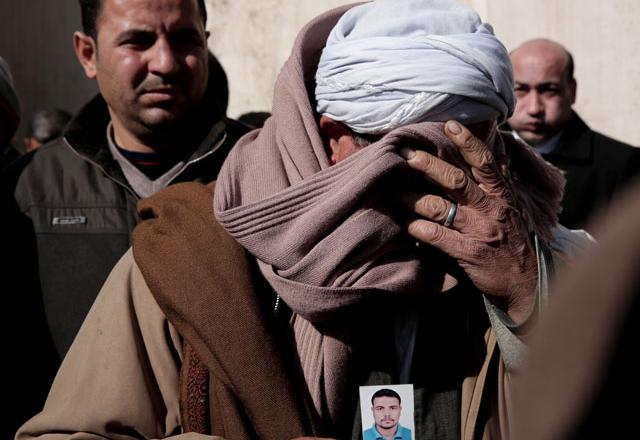You are here
Daesh expansion in chaotic Libya prompts intervention calls
By AFP - Feb 16,2015 - Last updated at Feb 16,2015
BENGHAZI, Libya — The chaos in Libya since Muammar Qadhafi's downfall has proven fertile ground for Daesh terror group, prompting increasing calls for foreign intervention to uproot the jihadists.
In a video released Sunday, Daesh said it beheaded 21 Egyptian Christians on a Libyan beach, in a likely bid to strike fear and show the Sunni extremists' reach now stretches beyond its Iraqi and Syrian strongholds.
It comes three weeks after Daesh opened a new front on Western targets in Libya when it claimed an attack on the luxurious Corinthia Hotel in central Tripoli that killed nine people, including five foreigners.
Islamist militants have thrived in Libya since Qadhafi was toppled and killed in the NATO-backed 2011 uprising, with authorities struggling to contain dozens of militant groups with diverse motivations and ideologies.
Amid the unprecedented uncertainty in the oil-rich North African nation, two main armed groups are vying for power.
The first is led by Khalifa Haftar, a former general who is backed by Libya's internationally recognised government and whose forces are fighting to drive Islamist fighters out of the country's east.
The other is Fajr Libya (Libya Dawn), an Islamist-led coalition that emerged from the western city of Misrata last summer to seize control of the capital and install its own government and parliament.
While it has regularly denounced "terrorism", Fajr Libya maintains links with the radical Ansar Al Sharia but does not recognise the Daesh’s presence in Libya.
'Sleeper cells'
Its parliament, the General National Congress, has so far declined to confirm that the beheading of 21 Egyptian Christians claimed by Daesh took place in Libya.
But a spokesman for Haftar's forces has said that "the Libyan army has engaged in fierce battles against [Daesh]".
"There are sleeper cells in every town who liaise directly with [Daesh leader Abu Bakr] Al Baghdadi," Colonel Ahmed Al Mesmari told AFP.
"And there will be other terrorist operations against Libyans and foreigners who live in Libya," he said, appealing for support from the international community.
Romain Caillet, an expert on jihadists, said that Daesh killed the 21 Egyptians to show that "its Libyan branch has now expanded and is the strongest outside of Iraqi and Syrian territory".
The rise of Daesh in Libya has heightened concerns in the region, including Egypt and Tunisia to its east and west, and Niger and Chad, southern neighbours who insist on the need for international intervention.
Complex situation
Across the Mediterranean, Italy is struggling to cope with an influx of migrants who set off for its shores from Libya, less than 300 kilometres away.
Rome on Monday ruled out military intervention in Libya in the short term, despite its defence minister talking of providing more than 5,000 men for a multinational intervention force which it would lead.
"Italy, whose coastline is very close to Libya, is most concerned by this threat," said analyst Ahmed Mohamed Nouh, explaining the talk of intervention.
"Europe understands that for it the problem hasn't come from Syria or Iraq, but from Libya which is very close to its shores."
An Arab diplomat formerly based in Tripoli said any military intervention in Libya would be difficult because of the complex situation on the ground.
"This would be rejected by Fajr Libya which has shady links with moderate Islamist groups and also radicals," said the diplomat who spoke on condition of anonymity.
"This will greatly reduce the chances of success of any coalition, even if it is mandated by the United Nations."
But another analyst, Mohamed Al Jareh, said the problem was no longer one for Libyans alone.
"At this stage, Libyans can no longer decide who can intervene in Libya, and how. Libya is no longer a Libyan problem," he said.
Related Articles
As fears grow that Daesh is building a new stronghold in violence-wracked Libya, analysts warn that international military intervention would risk plunging the country deeper into turmoil.
Assailants lobbed explosives at Algeria's embassy in the Libyan capital Saturday, wounding three people, a security official said, in an attack claimed by the Islamic State jihadist group.
The head of Libya's recognised government has pleaded for more help from the international community, warning that the country could become a dangerous haven for jihadists on Europe's doorstep.













